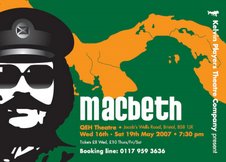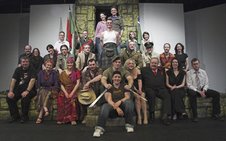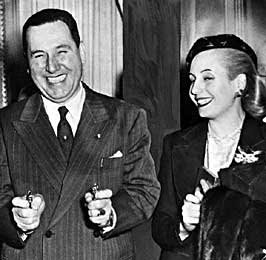The first review is out. Considering the reviewer has a very clear idea of how Shakespeare should be performed, she's actually very complimentary. Jog on.
http://www.bbc.co.uk/bristol/content/articles/2007/05/22/rev_kelvmacbeth_feature.shtml
We were also previewed, thrice.
We were Venue's Pick of the Week and got a whole column on pg.7 to ourselves. They went with the press release I sent them in the end, and mighty good it sounds too. Well done yous.
This is what the good lady Roche said of us on the BBC website by way of a preview:
http://www.bbc.co.uk/bristol/content/articles/2007/04/24/prev_macbeth_feature.shtml
And this is how good old Gerry Parker wrote us up in the Bristol Evening Post on 5th April:
"Local companies have been more inclined to present the Bard's work in traditional style but the Kelvin Players are about to change all that with their production of Macbeth ...
"A clue to where director Richard J Thomas and producer Raychel Hills are heading can be found in the club's events calender which carries a photograph of Gen. and Eva Peron next to the information about Macbeth.
They are transporting the Scottish play away from the damp gloom of the Highlands to the steamy jungle of 1970s Latin America.
Alex Needham courageously takes on the role of Macbeth which has defied many a top professional actor [no pressure Alex!].
...
The wonderful role of Lady Macbeth, a woman eaten out with naked ambition, has gone to Sue Keeler. Among a very strong cast, Simon Shorrock plays Banquo, John Lomas Macduff, Tim James [it's Thornton from now on] Malcolm and Richard Jones as the murdered King Duncan [I think he's a bit confused with Hamlet here].
Three ladies who should literally have a whale of a time [really? literally? literally have a whale of a time? Hills, have you ordered any whales?] are Janet McDermott, Cait Davies and Suzanne Faria who play the witches."
Thanks to Mrs B (future mother-in-law) for catching that.
Somewhere out there was another BEP article by Gerry, but I missed it, do send it to me if you come across it...
The theme explained
Macbeth in Caledonia
Macbeth set in the jungles of Central America in the late 1970s/early 1980s. Why?
Reasoning
Casting around for a way to present Macbeth without recourse to the ‘traditional’ medieval setting, I came to the idea of the Latin American juntas of the 1970s, where the military overthrew the legitimate governments of the time – think Peron, Evita, Galtieri and Pinochet. Bringing Macbeth into this setting allows us to clearly state that the story is timeless and handily also proffers up some wonderful associated imagery and themes: neat military outfits, the heat of the jungle, the indigenous Mayan-style culture in the background – Apocalypse Now in Shakespearian language… But how do I justify this as a setting for ‘the Scottish play’?
Historical Shoehorning
It is an historical curiosity that, in the dying years of the 17th century, a private Scottish company raised investment to fund the establishment of a colony in Latin America based on spurious accounts of the wealth to be had there. In 1698 the first of two ships, laden with hopeful colonists, left for the Darien Peninsula in today’s Panama, and founded ‘New Caledonia’. Within a few years most of the colonists were dead and the colony was abandoned.But what if it had not failed? Imagine that the Republic of Caledonia now sits astride the Panamanian isthmus, making its money from tobacco plantations and its world-famous Darien Canal. With its own tartan and its own idea of bagpipes. Having picked a modern theme, and come up with the historical justification, I then allowed the idea to gather its own logic.
Value Added
The most significant strand that is now to be threaded through the kilt of this ‘Macbeth in Caledonia’ is the Mayan culture. I see the Scottish-based ruling class in this fictional republic to be the alien invaders of an ancient and distinct land. Their imposed culture of titles, privileges, power and corruption sits on very shallow foundations. Beneath it, around it and permeating its darker moments is the indigenous culture (for the ease of finding reference material and ideas I have stretched the Mayan empire by about a 1000 miles to the south, but it is not unreasonable to think that, in our altered timeline, their influence might well have extended). Now we have a new undercurrent running through Shakespeare’s historical play. There is now a question of legitimacy beyond the squabbling of Macbeth and Macduff, right down to who deserves to be running this country. Them or us?
Thematic Considerations
What we have, then, is a 1970’s style steamy jungle: military uniforms, the constant sound of crickets in the night, a garish and non-permanent feel to the action. As its backdrop we have a much more ancient, proud and indifferent Mayan culture, with ancient beliefs, and a permanent confidence that it is they who own this land.To reflect this in the set, the action thunders around the immovable stone ruins of the Mayan culture: there when the audience and the actors enter, there throughout the power shifts in the play, there at the end as the theatre darkens; unchanging and indifferent to the flash of death and intrigue mustered by the Scots.
Macbeth set in the jungles of Central America in the late 1970s/early 1980s. Why?
Reasoning
Casting around for a way to present Macbeth without recourse to the ‘traditional’ medieval setting, I came to the idea of the Latin American juntas of the 1970s, where the military overthrew the legitimate governments of the time – think Peron, Evita, Galtieri and Pinochet. Bringing Macbeth into this setting allows us to clearly state that the story is timeless and handily also proffers up some wonderful associated imagery and themes: neat military outfits, the heat of the jungle, the indigenous Mayan-style culture in the background – Apocalypse Now in Shakespearian language… But how do I justify this as a setting for ‘the Scottish play’?
Historical Shoehorning
It is an historical curiosity that, in the dying years of the 17th century, a private Scottish company raised investment to fund the establishment of a colony in Latin America based on spurious accounts of the wealth to be had there. In 1698 the first of two ships, laden with hopeful colonists, left for the Darien Peninsula in today’s Panama, and founded ‘New Caledonia’. Within a few years most of the colonists were dead and the colony was abandoned.But what if it had not failed? Imagine that the Republic of Caledonia now sits astride the Panamanian isthmus, making its money from tobacco plantations and its world-famous Darien Canal. With its own tartan and its own idea of bagpipes. Having picked a modern theme, and come up with the historical justification, I then allowed the idea to gather its own logic.
Value Added
The most significant strand that is now to be threaded through the kilt of this ‘Macbeth in Caledonia’ is the Mayan culture. I see the Scottish-based ruling class in this fictional republic to be the alien invaders of an ancient and distinct land. Their imposed culture of titles, privileges, power and corruption sits on very shallow foundations. Beneath it, around it and permeating its darker moments is the indigenous culture (for the ease of finding reference material and ideas I have stretched the Mayan empire by about a 1000 miles to the south, but it is not unreasonable to think that, in our altered timeline, their influence might well have extended). Now we have a new undercurrent running through Shakespeare’s historical play. There is now a question of legitimacy beyond the squabbling of Macbeth and Macduff, right down to who deserves to be running this country. Them or us?
Thematic Considerations
What we have, then, is a 1970’s style steamy jungle: military uniforms, the constant sound of crickets in the night, a garish and non-permanent feel to the action. As its backdrop we have a much more ancient, proud and indifferent Mayan culture, with ancient beliefs, and a permanent confidence that it is they who own this land.To reflect this in the set, the action thunders around the immovable stone ruins of the Mayan culture: there when the audience and the actors enter, there throughout the power shifts in the play, there at the end as the theatre darkens; unchanging and indifferent to the flash of death and intrigue mustered by the Scots.
Subscribe to:
Posts (Atom)


